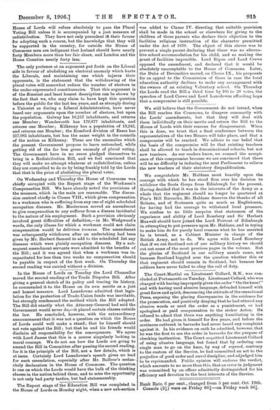In the House of Lords on Tuesday the Lord Chancellor
moved the second reading of the Trade Disputes Bill. After giving a general sketch of its policy and tracing its history, he commended it to the House on its own merits as a just and honest measure. Lord Lansdowne admitted that legis- lation for the protection of Trade-Union funds was inevitable, but strongly condemned the method which the Bill adopted. The Bill did exactly what the Attorney-General had said the Government would never do,—it placed certain classes outside the law. He concluded, however, with the extraordinary announcement that it was not a question on which the House of Lords could well make a stand ; that he himself should not vote against the Bill ; but that he and his friends would disclaim all responsibility for the consequences. We agree with Lord James that this is a course singularly lacking in moral courage. We do not see how the Lords are going to amend the Bill in Committee after passing the second reading, for it is the principle of the Bill, not a few details, which is at issue. Certainly Lord Lansdowne's speech gives no lead for such emendation, especially after Mr. Balfour's melan- choly declaration in the House of Commons. The question is one on which the Lords would have the bulk of the thinking classes in the nation behind them, and to miss the opportunity is not only bad party tactics, but bad statesmanship.


























































 Previous page
Previous page